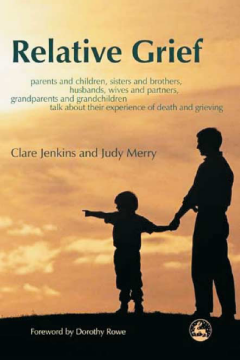
Additional Information
Book Details
Abstract
In this collection of first-hand accounts, parents, grandparents, children, siblings and partners share their experiences of losing close relatives and friends through death from natural causes, genetic conditions, accident, suicide and murder. Looking at death from these different perspectives, it aims to encourage people to understand their own grief and how those closest to them might be affected by what can seem a very private loss.
The introduction examines the short- and long-term effects of recent and past loss, the duration and intensity of mourning, and the difficult and often conflicting feelings and behaviours that accompany it: loneliness, anger, guilt or relief, the birth - or loss of - religious faith, out-of-character behaviour triggered by shock, and `competitive' grief among close relatives and friends.
Relative Grief is of interest to anyone who has been bereaved or supported someone who has. It will also be useful for those working with the bereaved, particularly hospice nurses, social workers, counsellors and therapists.
Clare Jenkins is a freelance journalist and broadcaster for BBC Radio 4. Her previous book, A Passion for Priests, looked at women's relationships with Roman Catholic Priests. Clare lives in Sheffield, UK. Judy Merry was a freelance producer and presenter working mainly for BBC Radio 4. She was also the book reviewer for BBC Radio 2's Good Morning Sunday programme.
Table of Contents
| Section Title | Page | Action | Price |
|---|---|---|---|
| INTRODUCTION 1 | |||
| 1 Terms and concepts 5 | |||
| Technology and infrastructure 5 | |||
| Technological development 12 | |||
| Economic structural development factors 15 | |||
| The technology transfer process 18 | |||
| Technology transfer models 22 | |||
| . . . and the reason why 25 | |||
| 2 The participants and their roles 27 | |||
| Modes of participation 27 | |||
| The national system 31 | |||
| The international level 36 | |||
| The consultant 42 | |||
| The technology carrier 44 | |||
| Gaps and linkages in the development process 47 | |||
| 3 Within the project framework - and beyond 52 | |||
| Goal formulation and development 52 | |||
| Project organization and execution 57 | |||
| The significance of the project framework 62 | |||
| The project in the development process 65 | |||
| Gauges of results and effects 68 | |||
| Resource allocation 71 | |||
| Goal compliance between actors 72 | |||
| 4 Sri Lanka - mobilizing for coastal defence 75 | |||
| Institutional context 76 | |||
| LHI: History, concept and operation 77 | |||
| Technology acquisition and implementation 81 | |||
| Participants and linkages 84 | |||
| Problems met and lessons learned 90 | |||
| 5 Thailand - mapping a turbulent development 94 | |||
| Institutional context 96 | |||
| Thailand Development Research Institute 98 | |||
| TDRI as a technology carrier 106 | |||
| Foundation and operation of TDRI 109 | |||
| Problems met and lessons learned 113 | |||
| 6 Bangladesh - river management and flood control 116 | |||
| Institutional context 117 | |||
| The River Research Institute 119 | |||
| The Surface Water Modelling Centre 121 | |||
| Technology acquisition and implementation 124 | |||
| Participants and linkages 126 | |||
| Problems met and lessons learned 129 | |||
| 7 India - a new approach to an old challenge 136 | |||
| Institutional context 137 | |||
| The Central Water Commission 137 | |||
| Technology acquisition and implementation 139 | |||
| Participants and linkages 144 | |||
| Problems met and lessons learned 150 | |||
| 8 The Philippines - environmental upgrading with social | |||
| constraints 154 | |||
| Institutional context 155 | |||
| The Pasig River programme 158 | |||
| Technology acquisition and implementation 164 | |||
| Participants and linkages 167 | |||
| Problems met and lessons learned 171 | |||
| 9 Feasibility of technological upgrading projects 175 | |||
| Participants and linkages 175 | |||
| Development determinants 179 | |||
| Resource allocation 189 | |||
| Goals and goal compliance 190 | |||
| 10 Process design implications 193 | |||
| The technological development project 193 | |||
| Institutional performance upgrading 197 | |||
| Development increment and implementation platform 200 | |||
| The demand condition 204 | |||
| The technology and the transfer process 206 | |||
| 11 Policy implications 211 | |||
| Guided development outside the project framework 211 | |||
| National development policy 216 | |||
| Technological infrastructure 219 | |||
| Orientation of development approach 222 | |||
| The role of the donor organization 223 | |||
| The social effect of technological development 228 | |||
| Appendix: Draft guidelines on technological upgrading projects 230 | |||
| References and further reading 239 |
